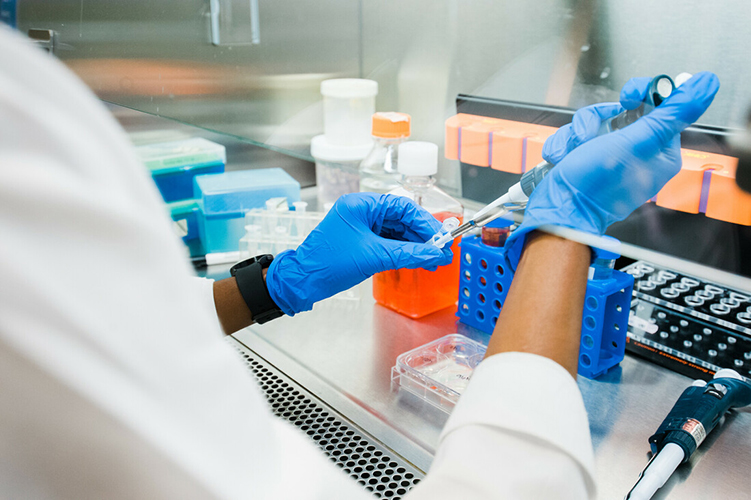 The Office of Research for the Heersink School of Medicine held a Strategic Research Retreat at the Alumni House on Wednesday, Feb. 15 to assess and discuss the newly identified focus areas.
The Office of Research for the Heersink School of Medicine held a Strategic Research Retreat at the Alumni House on Wednesday, Feb. 15 to assess and discuss the newly identified focus areas.
A task force was created for the themes to develop a strategic plan for each focus area. The Heersink School of Medicine is committing $1 million to each theme to facilitate opportunities and work to implement common needs identified in their plans.
Tika Benveniste, Ph.D., senior vice dean for Research in the UAB Heersink School of Medicine, provided a welcome and opening remarks. The retreat’s goals included providing short, mid- and long-term direction for the Heersink research enterprise for the next five-to-seven years with breakout sessions to discuss theme-specific needs. The task force also considered growth and collaboration opportunities with the UAB Health System, Southern Research, other schools, and beyond.
Benveniste is the chair of the Heersink School of Medicine Strategic Planning Steering Committee. She is joined on the committee by Anupam Agarwal, M.D., senior vice president of Medicine and dean of the Heersink School of Medicine, Jeremy Day, Ph.D., Anindya Dutta, M.D., Ph.D., Shaila Handattu, Ph.D., Robert Kimberly, M.D., Toni Leeth, MPH, Jayme Locke, M.D., MPH, Jeanne Marrazzo, M.D., MPH, Jason Nichols, O.D., MPH, Ph.D., Erik Roberson, M.D., Ph.D., Steve Rowe, M.D., MSPH, Barry Sleckman, M.D., Ph.D. and Amy Weinmann, Ph.D. The committee worked to develop each focus area, which were discussed at the retreat.
I-4Ward
The I-4Ward working group, led by Frances Lund, Ph.D., professor in the Department of Microbiology and director of the Immunology Institute, includes Andre Ballesteros, Ph.D., Khurram Bashir, M.D., David Kimberlin, M.D., Carlos Orihuela, Ph.D., and Rakesh Patel, Ph.D. The group highlighted the need for investment in technology and service centers to develop resources for researchers, big data management and integration, and strategic hires to bolster, expand, and build I-4ward-relevant research.
Brain Health and Disease Across the Lifespan
The Brain Health and Disease Across the Lifespan working group, led by Jeremy Day, Ph.D., associate professor in the Department of Neurobiology and director of the Comprehensive Neuroscience Center, includes Matthew Alexander, Ph.D., Karen Cropsey, Psy.D., Lynn Dobrunz, Ph.D., Alayn Markland, D.O., Donna Murfaugh, Ph.D., and Erik Roberson, M.D., Ph.D. The area of brain health is broad as it affects all ages, from infants to the elderly, and is tied to issues such as mental health and substance abuse. The group highlighted the need to focus on personnel, workforce training, and equipment and infrastructure investments.
Health Equity
The Health Equity working group, led by Michael Mugavero, M.D., professor in the Department of Medicine, Division of Infectious Diseases and director of the Center for Outcomes Effectiveness Research and Education, includes Andrea Cherrington, Ph.D., Caitlin Clevenger, Ph.D., Bertha Hidalgo, Ph.D., Gabriella Oates, Ph.D., and Alan Tita, M.D., MPH, Ph.D.
The group focuses on four components of Health Equity: sexual and gender minority health, women’s health across the lifespan, global and rural health, and health system and outcomes research. Their vision is that UAB will be recognized as the world's leading health equity institution of higher learning. The group highlighted the need to enhance sustainable collaboration in research, assemble a Collaborative Health Equity Council, increase training and professional development, and engage the community.
D-TECH
The D-TECH group, led by George Netto, M.D., Robert and Ruth Anderson Endowed Chair in the Department of Pathology, includes James Cimino, M.D., Suzanna Lapi, Ph.D., Merry-Lynn McDonald, Ph.D., Matthew Might, Ph.D., Amy Weinmann, Ph.D., and Ralph Zottola, Ph.D. D-TECH stands for Disruptive Technology Empowering Precision Health, indicating the group’s goal to reshape health care delivery through optimizing health with respect to all available data and developing novel technologies able to create, reshape and obsolesce entire disciplines. The group highlighted the need to invest in artificial intelligence, machine learning, and campus cyberinfrastructure, promote collaboration across disciplines, and develop strategies and services that allow collaboration while preserving patient privacy and confidentiality.
Following the breakout sessions, Benveniste reviewed each area’s needs and actionable items to improve the research enterprise at the school as a whole, and Agarwal provided the closing remarks for the retreat.
Learn more about the Heersink School of Medicine’s research focus areas.